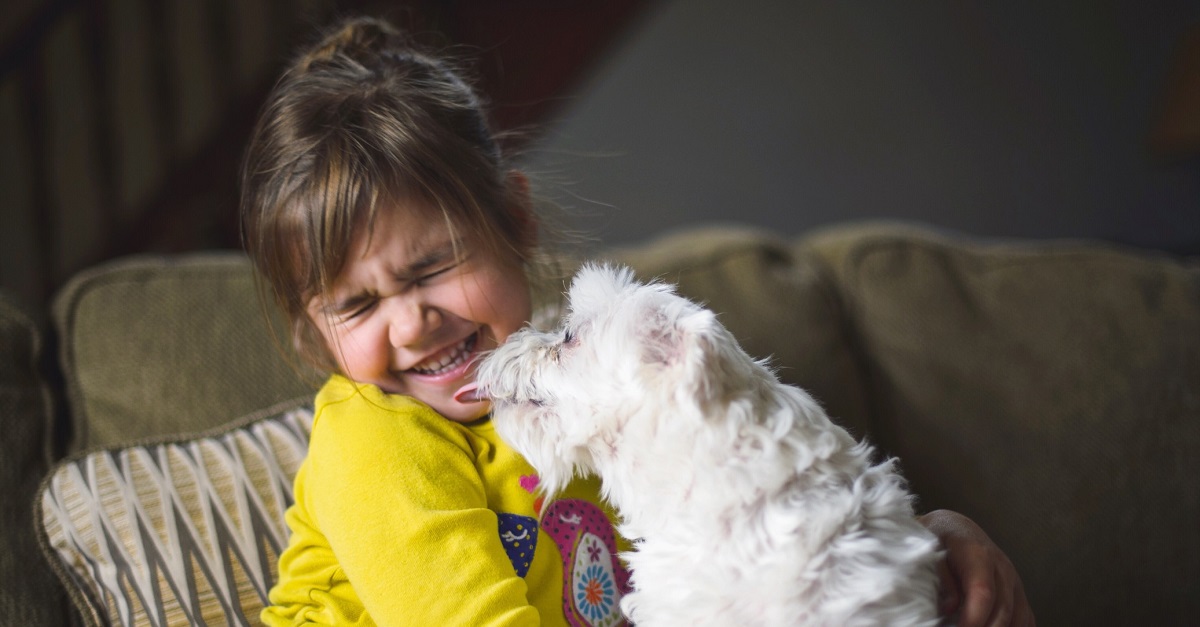
For many of us, dogs are the cutest members of our family. They have so many different personalities and can really add a lot of joy and charm to our day. So it should come as no surprise that they're also a positive influence on children.
While it's important for all children to know how to interact with dogs in a healthy way, children who own a dog often learn these safety lessons early on. Most dogs can be very friendly, but like people, they're all a little different. And it's important to make sure they keep a safe distance around animals they're unfamiliar with. But when kids feel comfortable enough to work with an animal, their personalities can actually improve.
The study was officially done by the University of Western Australia and the Telethon Kids Institute. It focused on children from the ages of 2 to 5. The study found that the participants who owned dogs at home "had a reduced likelihood of conduct and peer problems, as well as increased pro-social behaviors such as sharing and cooperating," per People magazine.
It really makes you think, especially since there isn't much we share with dogs. Except for, of course, a love of life.
The researchers also examined the amount of time that kids normally played with their dogs. "We're increasingly learning that pet ownership within families can have fantastic benefits for children's physical and social development," researcher Hayley Christian said in a Telethon Kids release, per People.
"Our previous research showed that pets can be particularly helpful for school-aged children, but this latest research shows the benefits begin even sooner — right from early childhood," Hayley continued. Even having a dog present helped children out in intriguing ways.
"While we expected that dog ownership would provide some benefits for young children's wellbeing, we were surprised that the mere presence of a family dog was associated with many positive behaviors and emotions," she continued. You likely knew that your own dog did wonders for your mood, but now there's science to back it up.
The study itself was very thorough. The researchers worked with 1,646 parents through a survey. They found that households that contained a dog guaranteed a 30% to 40% decrease in childhood issues with peers. So really, dogs might be a wonderful solution to peer-t0-peer bullying.
Preschoolers' prosocial behavior was said to increase by up to 74% just by walking or playing with their dogs approximately three times a week. That proves that it doesn't take much. Just standard interactions can make a big difference. Dogs also help with physical health.
Since dogs must be walked, they can help get younger children outside and moving. "Given how important physical activity is to a child's health and social and emotional development, we really need to make the most of any opportunity to get kids moving," Hayley noted. "Our research suggests family [dog] ownership could be a valuable strategy in achieving this."
If you've been on the fence about getting a dog, this research may push you to make the move. Just remember, they're a big responsibility. The best way for your children to get the most out of a dog is to make sure that dog is happy and well cared for. Consider it like taking on a fuzzy, adorable child — especially if you choose a puppy.
Dogs provide many other benefits to a household. The American Kennel Club states that dogs are an incredible way for people of all ages to reduce stress. Aaron Katcher of the University of Pennsylvania and Alan Beck of Purdue realized this in a study done in the 1980s. Petting dogs helps to lower your blood pressure.
Dogs have also been linked to improving heart health. The American Journal of Cardiology published a study that followed the progress and health of 369 individuals who had suffered heart attacks. The patients who owned dogs did better than the ones who didn't.
Dogs also help make us more social. They can be excellent roommates (and great companions) for those who live at home and don't have much human interaction. Plus, people like talking about dogs. So having one is an excellent icebreaker for conversations.
But one of the most amazing things dogs can do is detect certain disorders and cancers. The American Kennel Club notes that dogs can be trained to sniff out prostate cancer. They can also make sure a room is rid of peanuts and peanut traces for those who may be severely allergic.
Our friendship with dogs is one that's only getting stronger as the years go by. They can help us cope with loss or just serve as a good reminder to get up in the morning during days when our mental health may be at an unhealthy level. And they can also make us feel secure.
While dogs shouldn't be treated like a home security service, they do persuade robbers to target other homes. According to Vector Security, home invaders like to avoid houses that have dogs. The larger the dog, the more of a deterrent it is. So that might help ease any anxiety you have over the possibility.
Regardless, it's a great reason to go to a shelter to see if you form a connection with any of the dogs there. While you might just want to browse and see who's available, you may end up accidentally meeting your new best friend. And if you have kids, you can feel good knowing that they'll also benefit from your pup's adoption.




